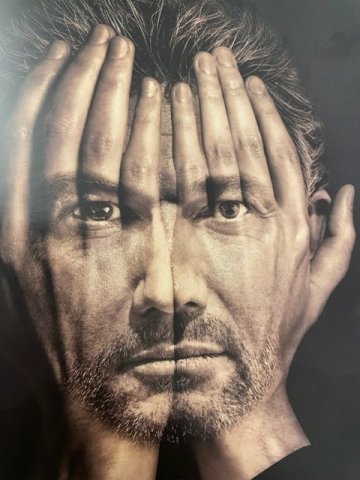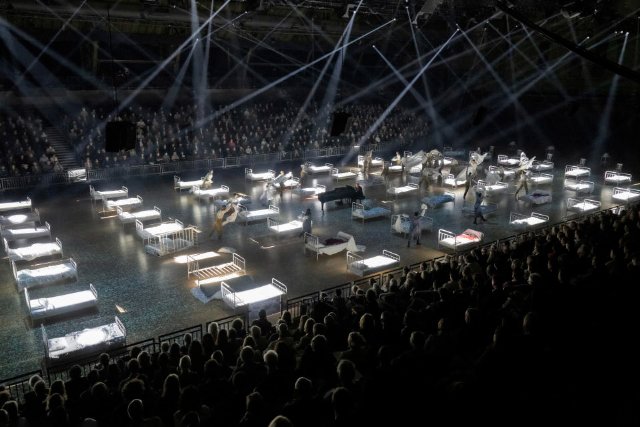Dopplegangers at the Park Avenue Armory
Jonas Kaufman and Helmut Deutsch Double Our Pleasure
By: Susan Hall - Sep 28, 2023
I like to attend an event without reading the build-up. This gives me a chance to respond viscerally. Every event at the Park Avenue Armory is tasteful. Pierre Audi, the artistic director, provides this. He is unique in New York.
Sometimes his mountings work and sometimes they don’t, but they are always engaging.
Before I entered the Armory, I knew that Schubert had died young of syphilis. I knew that the songs Jonas Kaufmann would perform, Schwanengesang, were among his last works. Opening the performance up with a theater on the floor of the Armory I may have expected some relationship between the composer's diseased mind in the tertiary phase of syphilis (a la Nietzche and the famous fictional composer Adrian Leverkühn of Thomas Mann’s Dr. Faustus,). I immediately found it.
I imagined that the 63 or so beds lined up across the floor were in an insane asylum. About a third of the beds were occupied. Slowly I imagined the men who occupied about a third of the beds both as other asylum inmates and also as figments of the composer's/singer's imagination. Seeing himself repeated over and over again is surely a source of anxiety for the singer/composer. Doppelgangers galore.
The songs of the group are perfectly beautiful, even when they are tortured. This felt like the doppelganger effect too.
Six nurses march across the floor. Sometimes they are in two groups of three. At one point, they are hoisted high by the inmates. Sheer madness.
I noticed the crosses on the back of their uniforms but did not think they signified War. The Red Cross was not, as best as I can determine, founded when Schubert was alive.
Don’t imagine with all this imagining that I was not thoroughly engaged in the music. Jonas Kaufmann singing, with Helmut Deutsch at the piano, engaged completely. The strings of the piano were miced. So too was the singer. Yet, the audio crew at the Armory did a very good job of making the singing sounds resonate through the hall. The voice was not simply directed from the singer's position, and therefore pitched at one section of the audience in this large, grand space, but filled the Thompson Drill Hall. Kaufmann is not afraid to go quiet and soft and the audio engineers made this possible.
I would not have had the guts to share this impression in writing had I not engaged in a lively conversation with a formidable composer and a formidable director waiting for the crosstown bus after the show, and then on and off the bus. The director said he preferred my version of what was happening. So what if this was intended to be a military hospital during wartime? (I could not avoid the wartime setting when the shadow of an airplane was cast moving across the floor) At the Armory you can take these doppelganger journeys. The lighting is always perfect (Urs Schoenebaum). The audio too is delivered to maximize pleasure (Mark Grey). The subject matters, on your own terms.
In Europe, Kaufmann has been known for his cancellations of late. But he was completely present and in a wonderful voice for these Schubert songs. Helmut Deutch seemed comfortable performing on his topless instrument. He even stroked the strings of the sounding board. He played a beautiful interlude, the Andante sostenuto of Schubert’s 21st piano sonata, between the compositions based on Ludwig Rellstab’s poetry and that of Heinrich Heine.
This was another stunning, moving evening at the Armory.


